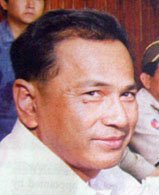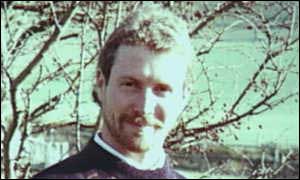Justice on trial
A long day in court today came to a messy conclusion at 7.05pm when the presiding judge Iv Kimsry announced the trial of the 5 Khmer Rouge cadres accused of murdering Briton Christopher Howes and his Cambodian translator Houn Hourth, would be adjourned until 8am on 14 October. Throughout the day, which began at 8.10am at the Phnom Penh Municipal Court, the judge had looked set on concluding the trial in just one day as all five defendants answered questions about their role in the abduction and murder of the two members of the MAG demining team that were kidnapped on 26 March 1996 and killed a few days later. Evidence was presented, witnesses called, statements read out and closing arguments heard from both the defense and prosecution before the three judges decided enough was enough and adjourned. All five defendants pleaded their innocence, instead claiming the order to kill and the actual shooting of Bristol-born Howes was in fact the responsibility of two other Khmer Rouge guerrillas, both of whom are conveniently dead. The blame for ordering Howes' death was laid at the feet of Khem Tem, who died in a car accident near Surin in Thailand in June 2007, whilst Soeun Rim was fingered as the man who shot Howes in the head from close range, and who died in a landmine incident in 2004.
 The man who many believe supervised the killing of Howes and was the last person to speak with him, Khem Nguon (pictured right), cut a frail and pathetic figure in court, a far cry from the swaggering media-hungry opportunist who led the final draft of Khmer Rouge soldiers to defect to the government in December 1998. Nguon, now 59 years of age and who collected an amnesty and a Brigadier-General posting in the Royal Cambodian Armed Forces for his defection, shuffled into court at 2.30pm with a hearing-aid in his left ear, and within the hour had collapsed into the arms of security personnel, requiring support from his two children. He also shunned the limelight of his former Khmer Rouge noteriety, refuting suggestions that he was Ta Mok's No 2, instead promoting Khem Tem to that lofty position, and claiming he merely offered advice to farmers. Like his fellow defendants, Nguon claimed memory loss, blamed others and wriggled his way out of any suggestion that he had organized the killing of Christoper Howes. Meanwhile, Loch Mao, who was in the frame as Howes' killer and had admitted as much in an earlier interview, said his gun failed to fire when he aimed it at Howes' chest and that the Briton was already dead from a fatal shot from the gun of Soeun Rim. The other defendants, Puth Lim who was Nguon's driver, Sin Dorn and Chep Cheat allegedly played lesser roles but still face murder charges.
The man who many believe supervised the killing of Howes and was the last person to speak with him, Khem Nguon (pictured right), cut a frail and pathetic figure in court, a far cry from the swaggering media-hungry opportunist who led the final draft of Khmer Rouge soldiers to defect to the government in December 1998. Nguon, now 59 years of age and who collected an amnesty and a Brigadier-General posting in the Royal Cambodian Armed Forces for his defection, shuffled into court at 2.30pm with a hearing-aid in his left ear, and within the hour had collapsed into the arms of security personnel, requiring support from his two children. He also shunned the limelight of his former Khmer Rouge noteriety, refuting suggestions that he was Ta Mok's No 2, instead promoting Khem Tem to that lofty position, and claiming he merely offered advice to farmers. Like his fellow defendants, Nguon claimed memory loss, blamed others and wriggled his way out of any suggestion that he had organized the killing of Christoper Howes. Meanwhile, Loch Mao, who was in the frame as Howes' killer and had admitted as much in an earlier interview, said his gun failed to fire when he aimed it at Howes' chest and that the Briton was already dead from a fatal shot from the gun of Soeun Rim. The other defendants, Puth Lim who was Nguon's driver, Sin Dorn and Chep Cheat allegedly played lesser roles but still face murder charges.
Included amongst the witnesses were former Cambodian intelligence chief Colonel Dom Hak, Scotland Yard detective Mike Dixon and members of Howes' MAG demining team. It was Dixon who interviewed many of the key faces in the murder inquiry on behalf of the British Embassy in 1998 and who recovered Houn Hourth's skull from the village of Kul in July 1999. It was alleged that Hourth had been murdered by a cadre called Han after he was deemed surplus to requirements, whilst Howes had been taken to Anlong Veng, kept in a school before he was shot and his body burnt a few hundred yards from the home of Ta Mok. It would be another two years before forensic evidence identified bone fragments belonging to Howes and confirmation of his death given to his parents. Howes' father Roy was not well enough to attend today's trial and he was represented by Lou McGrath OBE, the Chief Executive of MAG. However, both families of the murdered deminers will have to wait a little while longer to see if justice is delivered as the verdict from the presiding judges will be announced on 14 October.
 The man who many believe supervised the killing of Howes and was the last person to speak with him, Khem Nguon (pictured right), cut a frail and pathetic figure in court, a far cry from the swaggering media-hungry opportunist who led the final draft of Khmer Rouge soldiers to defect to the government in December 1998. Nguon, now 59 years of age and who collected an amnesty and a Brigadier-General posting in the Royal Cambodian Armed Forces for his defection, shuffled into court at 2.30pm with a hearing-aid in his left ear, and within the hour had collapsed into the arms of security personnel, requiring support from his two children. He also shunned the limelight of his former Khmer Rouge noteriety, refuting suggestions that he was Ta Mok's No 2, instead promoting Khem Tem to that lofty position, and claiming he merely offered advice to farmers. Like his fellow defendants, Nguon claimed memory loss, blamed others and wriggled his way out of any suggestion that he had organized the killing of Christoper Howes. Meanwhile, Loch Mao, who was in the frame as Howes' killer and had admitted as much in an earlier interview, said his gun failed to fire when he aimed it at Howes' chest and that the Briton was already dead from a fatal shot from the gun of Soeun Rim. The other defendants, Puth Lim who was Nguon's driver, Sin Dorn and Chep Cheat allegedly played lesser roles but still face murder charges.
The man who many believe supervised the killing of Howes and was the last person to speak with him, Khem Nguon (pictured right), cut a frail and pathetic figure in court, a far cry from the swaggering media-hungry opportunist who led the final draft of Khmer Rouge soldiers to defect to the government in December 1998. Nguon, now 59 years of age and who collected an amnesty and a Brigadier-General posting in the Royal Cambodian Armed Forces for his defection, shuffled into court at 2.30pm with a hearing-aid in his left ear, and within the hour had collapsed into the arms of security personnel, requiring support from his two children. He also shunned the limelight of his former Khmer Rouge noteriety, refuting suggestions that he was Ta Mok's No 2, instead promoting Khem Tem to that lofty position, and claiming he merely offered advice to farmers. Like his fellow defendants, Nguon claimed memory loss, blamed others and wriggled his way out of any suggestion that he had organized the killing of Christoper Howes. Meanwhile, Loch Mao, who was in the frame as Howes' killer and had admitted as much in an earlier interview, said his gun failed to fire when he aimed it at Howes' chest and that the Briton was already dead from a fatal shot from the gun of Soeun Rim. The other defendants, Puth Lim who was Nguon's driver, Sin Dorn and Chep Cheat allegedly played lesser roles but still face murder charges.Included amongst the witnesses were former Cambodian intelligence chief Colonel Dom Hak, Scotland Yard detective Mike Dixon and members of Howes' MAG demining team. It was Dixon who interviewed many of the key faces in the murder inquiry on behalf of the British Embassy in 1998 and who recovered Houn Hourth's skull from the village of Kul in July 1999. It was alleged that Hourth had been murdered by a cadre called Han after he was deemed surplus to requirements, whilst Howes had been taken to Anlong Veng, kept in a school before he was shot and his body burnt a few hundred yards from the home of Ta Mok. It would be another two years before forensic evidence identified bone fragments belonging to Howes and confirmation of his death given to his parents. Howes' father Roy was not well enough to attend today's trial and he was represented by Lou McGrath OBE, the Chief Executive of MAG. However, both families of the murdered deminers will have to wait a little while longer to see if justice is delivered as the verdict from the presiding judges will be announced on 14 October.



0 Comments:
Post a Comment
<< Home